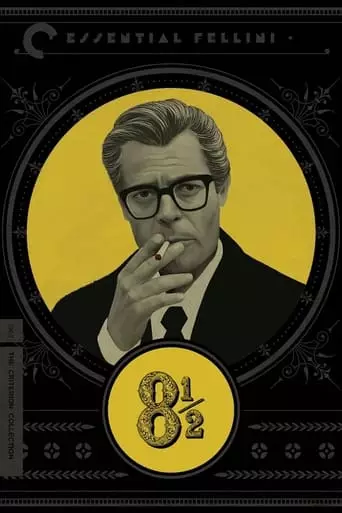
8½ (1963) Watch Online Free
Guido Anselmi, a film director, finds himself creatively barren at the peak of his career. Urged by his doctors to rest, Anselmi heads for a luxurious resort, but a sorry group gathers—his producer, staff, actors, wife, mistress, and relatives—each one begging him to get on with the show. In retreat from their dependency, he fantasizes about past women and dreams of his childhood.
Federico Fellini’s 8½ follows the journey of Guido Anselmi (Marcello Mastroianni), a renowned film director who finds himself struggling with a creative block while working on his next movie. At a crossroads in his career and life, Guido is unable to reconcile his personal and professional worlds. His mind is overwhelmed by fantasies, memories, and desires, which blur the lines between reality and imagination. As he faces mounting pressure from producers, writers, and actors, Guido retreats to a spa for rest, hoping to find clarity. However, his personal life remains complicated, with a wife (Anouk Aimée), a mistress (Sandra Milo), and a host of other women who haunt his thoughts. Through surreal dream sequences and fragmented narrative shifts, the film explores the complexities of artistic creation, self-doubt, and existential crisis.
8½ is a meta-cinematic exploration of the struggles faced by an artist. The film reflects Fellini’s own difficulties as a filmmaker, mirroring the director’s personal crisis during the production of his previous film. The film is often hailed as a masterpiece of modern cinema for its innovative narrative structure and visual style. It plays with themes of identity, the relationship between reality and illusion, and the burden of expectation placed on artists.
One of the film’s most prominent themes is the tension between personal desire and professional duty. Guido’s relationships with the women in his life—his wife, his mistress, and the idealized image of Claudia (Claudia Cardinale)—represent various aspects of his internal conflict. These women are both muses and obstacles, embodying the roles that Guido must navigate in his search for creative inspiration. His fantasies, such as imagining a harem of women devoted to him, are ironic reflections of his inability to connect with others authentically.
The film also addresses the nature of cinema itself, questioning its role as both an artistic expression and a commercial endeavor. Fellini critiques the pressures of the film industry, where creative freedom is often compromised by financial and institutional demands. The surreal imagery and narrative disjunctions in 8½ emphasize the subjective nature of filmmaking, where the line between art and personal experience is fluid.
8½ is widely regarded as one of the most influential films in the history of cinema. Its unconventional narrative structure, blending dreams, memories, and reality, inspired countless filmmakers. The film’s impact is seen in works by directors such as Woody Allen (in Stardust Memories), Robert Altman, and Charlie Kaufman, who have all explored similar themes of self-doubt, artistic crisis, and the blurred boundaries between life and art. Fellini’s use of visual motifs, such as the recurring parade at the film’s conclusion, continues to resonate in contemporary cinema, influencing the way filmmakers approach storytelling and character development.
The film’s exploration of the creative process also had a profound effect on how audiences and critics perceive the role of the director in shaping a film. It shifted the focus from the narrative itself to the internal struggles of the creator, making 8½ a landmark in the genre of films about filmmaking.
Watching 8½ is an immersive experience that leaves the viewer with a sense of awe and contemplation. The film’s surreal and fragmented narrative may initially be disorienting, but it invites introspection about the nature of creativity and personal identity. You may feel a mix of confusion and wonder as you try to piece together the layers of meaning within the film. By the end, you might be left with a sense of melancholy, as the film’s exploration of existential struggles and the pursuit of artistic perfection feels both deeply personal and universal. The film’s unresolved nature and its open-ended questions about the meaning of life and art will likely linger in your mind long after the credits roll.
In essence, 8½ is a film that challenges its audience, offering no easy answers but encouraging a deeper understanding of the complexities of the human experience. You may feel inspired to reflect on your own creative endeavors and personal struggles, making 8½ a truly transformative cinematic journey.
